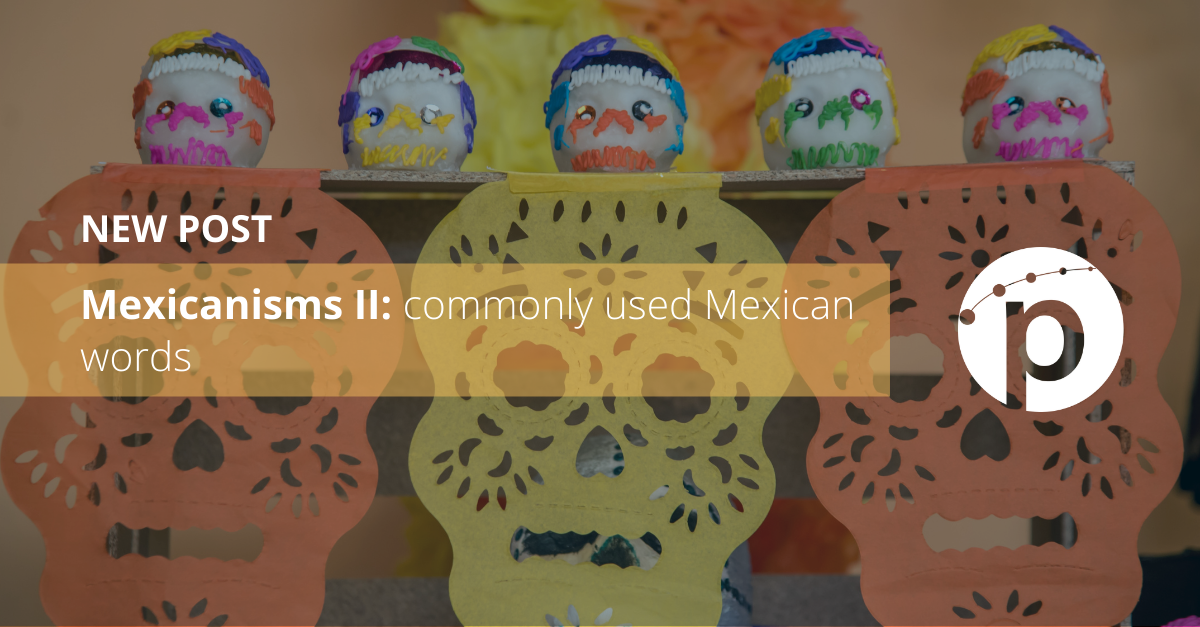As well as being a tremendous country, Mexico is one of the real linguistic driving forces of Latin America. Here are some Mexicanisms and their...
As we said in Mexicanisms I: widely used Mexican expressions, Mexico is one of the real linguistic driving forces of Latin America. While some of these Mexican words come from Spanish spoken in Spain many years ago, others are based on the enormous influence that the Mayan civilization has had on the Spanish language.
Let’s get down to business and take a look at commonly used Mexican words. But before that, remember that in a previous post we shared widely used Mexican expressions, and we will have a third post with the most popular proverbs in Mexico. As always, we have aimed to be as thorough as possible in conveying the most accurate meaning of these expressions, but if you know of any other variants or definitions that are worth taking into account, feel free to let us know!
Commonly used Mexican words
- Achicopalarse. From the Náhuatl language, this is to feel as though you’re inadequate for a particular task and to feel low emotionally.
- Apapachar. From the same language as the previous one, meaning to massage or to rub.
- Arrecholar. A word used in the state of Coahuila, meaning to shut oneself away and do nothing. For example, "Me arrecholé y así pasé la tarde," meaning: "I spent the whole afternoon just staying inside at home."
- Bonche. This can refer to both a group of friends going on a night out and a large amount of something. "En la mesa había bonche de tacos” (There were loads of tacos on the table).
- Cantinflear. This term is included in the RAE dictionary, but we think it’s important to highlight where this comes from to give the credit that is really deserved. This refers to the eternal character "Cantinflas," created by the great Mario Moreno, known for speaking without actually saying anything. We love him. What about you?
- Chambear. Synonym of "to work." "Chamba" means job position.
- Chela. Used to refer to "beer." But, be careful! It has a variant, "michelada," which sets itself apart from standard beer in account of the chili powder on the rim of the glass it is served in.
- Chincual. A classic of the Veracruz region, meaning "party."
- Chingaquedito. This is a person who seems nice, cool and calm, but will take any opportunity to speak badly of others. For example: "No seas chingaquedito" (don’t be so two-faced).
- Chingón. Ideal word for describing something that’s very good or positive. When used to describe a person, it refers more to their intelligence.
- Chipocludo. Somebody who does their job efficiently and responsibly.
- Enmuinarse. From the North of the country, meaning "to become angry."
- Escuincle. From the Náhuatl language, this is a synonym of the Spanish word "mocoso," meaning "child."
- Fresa. A posh person who over-pronounces their words to put emphasis on their social status.
- Guandajón. Used to describe men who don’t look after their physical appearance and who always wear oversized clothes.
- Güero/a. Blonde.
- Güey. Another very commonly used word. Usually used to mean peer or friend, but can also be used to mean stupid or clumsy.
- Locochón. Can be used as a synonym of the previous word, and is also useful for describing something daring or different.
- Merequetengue. A party or celebration with many people, or an obstacle in the way of achieving something.
- Neta. Colloquial word referring to the absolute truth.
- Padrísimo. This has nothing to do with parents. It means that something is excellent or that you really like it.
- Ruco/a. Used exclusively in Mexico to refer to the elderly. In other countries it means the complete opposite.
- Sacatón. He who lacks bravery and acts in a cowardly manner.
- Teporocho. Alcoholic.
- Teto. Forget about the Spanish association of the word, as this means clumsy or somebody who isn’t very bright.
- Tompiates. A basket used by indigenous people to transport food. Due to its similarity in appearance, it is also used to mean testicles.
- Vaquetón. Sluggish, lacking motivation to work.
Do you need translations into Spanish?
Spanish translations by qualified, native Spanish translators
Related Posts
The last Mexicanisms post of the series, in which you can learn some of the most popular Mexican proverbs that make Mexico a linguistic driving force...
As we said in Mexicanisms I: widely used Mexican expressions, Mexico is one of the real linguistic driving forces of Latin America. While there are...



.png?width=130&name=Los%20datos%20pueden%20hablar%20con%20la%20gente%20(3).png)